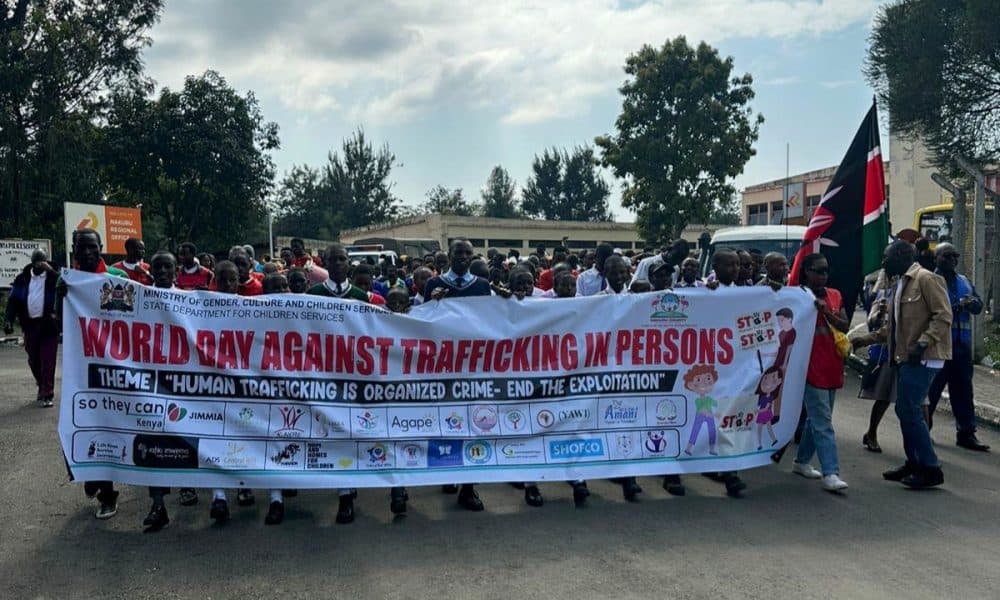We're loading the full news article for you. This includes the article content, images, author information, and related articles.
UN data show >200 k victims detected 2020-23; Kenya vows tougher, survivor-centred response.

Nakuru, Kenya – August 1, 2025
Kenya will mark this year’s World Day Against Trafficking in Persons with a national commemoration in Nakuru, as the United Nations warns of a global surge in trafficking cases — fueled by organised criminal networks exploiting migration routes and digital platforms.
The event, scheduled for August 2, will bring together government officials, civil society groups, international agencies, and survivors of human trafficking to raise awareness and push for stronger action against what experts now call a “shadow pandemic” preying on the vulnerable.
“Traffickers are becoming more coordinated, more digital, and more ruthless,” said Ghada Waly, Executive Director of the United Nations Office on Drugs and Crime (UNODC), in a statement marking the international observance. “From job scams to forced labour and online exploitation, the threats are evolving faster than protections.”
According to the latest UNODC Global Trafficking in Persons Report, Africa is witnessing a disturbing rise in trafficking incidents, especially among migrants, displaced persons, and children. Victims are increasingly recruited through online platforms, false job offers, or coercion by smugglers promising safe passage abroad.
In Kenya, the government has identified emerging trafficking hotspots linked to cross-border migration through the northern and coastal corridors. Women and girls remain the most targeted group, particularly for sexual exploitation and domestic servitude, while boys and young men are trafficked into forced labour, drug peddling, or radicalisation networks.
Interior Cabinet Secretary Kithure Kindiki, who is expected to officiate the Nakuru event, said the government is scaling up enforcement through specialised anti-trafficking units and expanded surveillance at key border points, airports, and recruitment agencies.
“Human trafficking is a national security threat, not just a social crime,” Kindiki said. “We must deal with both the recruiters and the enablers — including those abusing digital platforms and travel agencies.”
This year’s theme, “Leave No One Behind”, focuses on survivor empowerment and the urgent need for comprehensive victim protection — including access to legal aid, psychosocial support, shelter, and reintegration programs.
The Nakuru event will feature testimonies from survivors, youth-led anti-trafficking groups, and civil society actors advocating for better coordination between law enforcement and social services.
Agencies like the International Organization for Migration (IOM) and HAART Kenya are expected to showcase grassroots interventions that target trafficking at the community level, especially in rural and informal settlements.
The UN has raised particular concern about the weaponisation of technology in trafficking — with criminal networks using encrypted messaging apps, fake social media profiles, and online classifieds to recruit, exploit, and control victims across borders.
“Technology must be part of the solution, not the problem,” said Waly. “We need stronger tech-industry regulation, victim-centred digital reporting tools, and public awareness on online safety.”
Kenya’s National Referral Mechanism for victims of trafficking is currently under review, with proposed updates to improve survivor services, speed up prosecutions, and align with international standards.
As the Nakuru event unfolds, campaigners are urging the public to remain alert to signs of trafficking — including sudden disappearances, coercive job offers, and abuse of vulnerable youth by fake recruiters or rogue relatives.
With the UN projecting over 50 million victims of modern slavery globally as of 2024, the message is clear: ending trafficking requires a whole-of-society response — from law enforcement to families, schools, border agents, and tech platforms.
Keep the conversation in one place—threads here stay linked to the story and in the forums.
Sign in to start a discussion
Start a conversation about this story and keep it linked here.
Other hot threads
E-sports and Gaming Community in Kenya
Active 9 months ago
The Role of Technology in Modern Agriculture (AgriTech)
Active 9 months ago
Popular Recreational Activities Across Counties
Active 9 months ago
Investing in Youth Sports Development Programs
Active 9 months ago